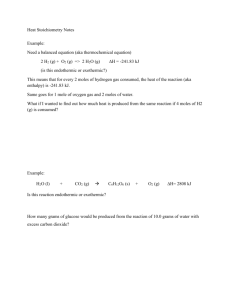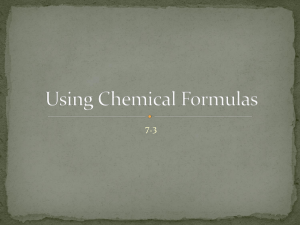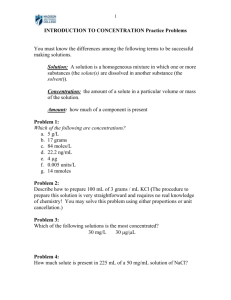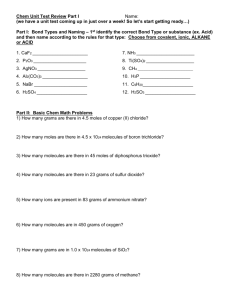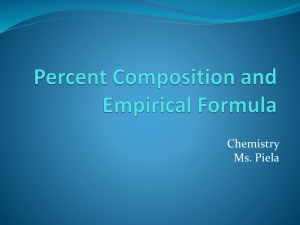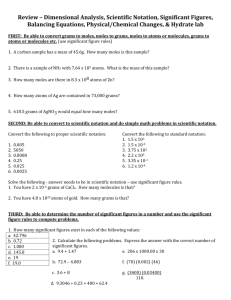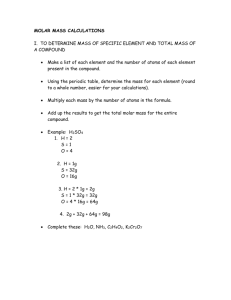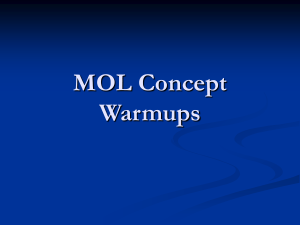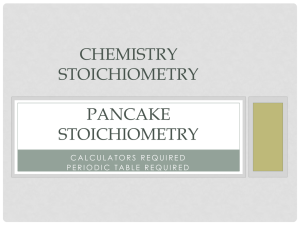Chemistry Semester Test Study Guide Day 1 What are the diatomic
advertisement
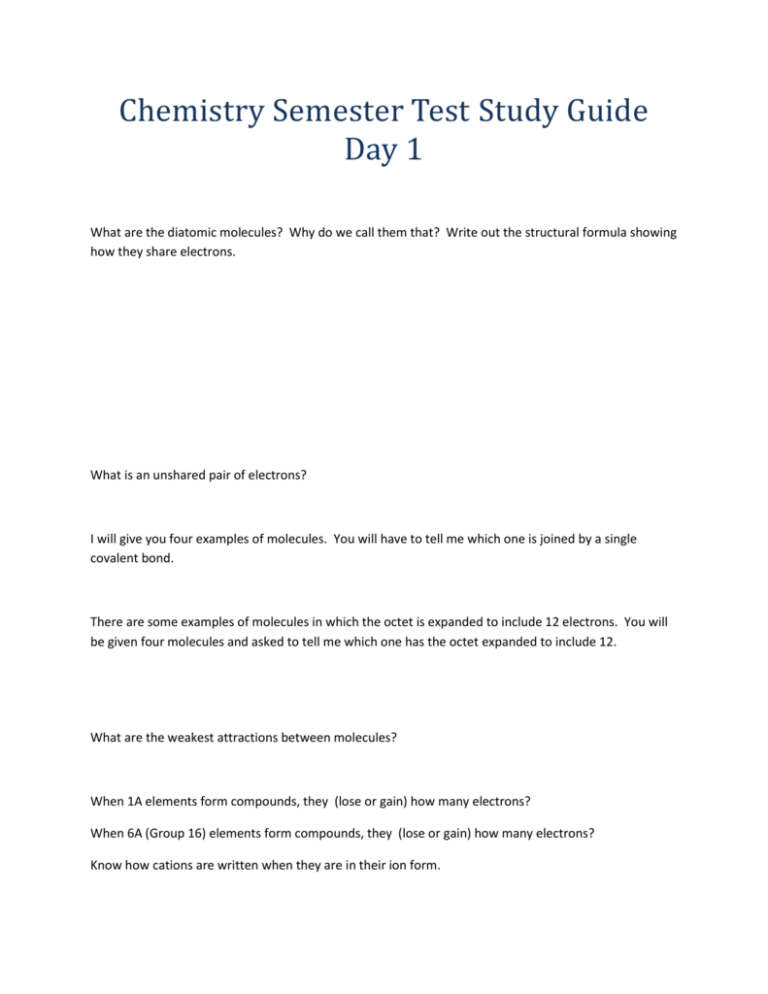
Chemistry Semester Test Study Guide Day 1 What are the diatomic molecules? Why do we call them that? Write out the structural formula showing how they share electrons. What is an unshared pair of electrons? I will give you four examples of molecules. You will have to tell me which one is joined by a single covalent bond. There are some examples of molecules in which the octet is expanded to include 12 electrons. You will be given four molecules and asked to tell me which one has the octet expanded to include 12. What are the weakest attractions between molecules? When 1A elements form compounds, they (lose or gain) how many electrons? When 6A (Group 16) elements form compounds, they (lose or gain) how many electrons? Know how cations are written when they are in their ion form. Know how anions are written when they are in their anion form. Know the rules for naming ionic and molecular compounds. When naming a compound with a transition metal, how do we write the name? What are ionic compounds composed of? What are molecular compounds composed of? Be able to recognize and use polyatomic ions in naming compounds. What SI unit is used to measure the number of representative particles in a substance? What is the difference between an empirical formula and molecular formula? Be able to recognize each. Be able to convert from: atoms to moles moles to atoms molecules to moles moles to molecules liters to moles moles to liters Sample Problems: How many moles of silver atoms are in 3.3 10 atoms of silver? How many atoms are in 13.4 mol of titanium? How many molecules are in 5.10 mol CO ? What is the volume, in liters, of 0.36 mol of O2 gas at STP? What is the volume, in liters, of 12.2 mol of C H gas at STP? What is the number of moles in 523 L of Ar gas at STP? What is the number of moles in .8 L of He gas at STP? What is the density at STP of the gas sulfur hexafluoride, SF ? If 60.2 grams of Hg combines completely with 24.0 grams of Br to form a compound, what is the percent composition of Hg in the compound? Chemistry Semester Test Study Guide Day 2 Read the instructions for day 2 of the test below. Day 2 consists of 17 short answer questions. Short Answer Balance the following equations and complete the equation if asked to do so. REWRITE ALL EQUATIONS INVOLVING BALANCING FOR FULL CREDIT!!! In problems involving calculations, solve for the quantity indicated. There are 17 questions on the exam. I will only count 15, so you may leave 2 questions blank. If you attempt all 17, YOU INDICATE WHICH 2 YOU DO NOT WANT ME TO GRADE!!! If you don’t do that, I will not count the last two on the test. Below are plenty of equations to practice balancing for the test. Some require you to finish the equation before balancing. 1) ____ Na3PO4 + ____ KOH 2) ____ MgF2 + ____ Li2CO3 ____ MgCO3 + ____ LiF 3) ____ P4 + ____ O2 4) ____ RbNO3 + ____ BeF2 ____ Be(NO3)2 + ____ RbF 5) ____ AgNO3 + ____ Cu ____ Cu(NO3)2 + ____ Ag 6) ____ CF4 + ____ Br2 7) ____ HCN + ____ CuSO4 ____ H2SO4 + ____ Cu(CN)2 8) ____ GaF3 + ____ Cs 9) ____ BaS + ____ PtF2 10) ____ N2 + ____ H2 ____ NH3 11) ____ NaF + ____ Br2 ____ NaBr + ____ F2 12) ____ Pb(OH)2 + ____ HCl ____ H2O + ____ PbCl2 13) ____ AlBr3 + ____ K2SO4 ____ KBr + ____ Al2(SO4)3 14) ____ CH4 + ____ O2 (Be careful here…what kind of reaction is it?) 15) ____ Na3PO4 + ____ CaCl2 ____ NaCl + ____ Ca3(PO4)2 16) ____ K + ____ Cl2 17) ____ Al + ____ HCl ____ H2 + ____ AlCl3 18) ____ N2 + ____ F2 ____ NF3 19) ____ SO2 + ____ Li2Se 20) ____ NH3 + ____ H2SO4 ____ (NH4)2SO4 Here are plenty of Stoichiometry problems to practice on for the test. These problems cover the same concepts used to solve the problems on the test, but they may be written in a different format than what you will see on the test. How many grams of CO are needed to react with an excess of Fe O to produce 454 g Fe? Fe O (s) + 3CO(g) 3CO (g) + 2Fe(s) 1. Given the following equation: 2 C4H10 + 13 O2 ---> 8 CO2 + 10 H2O, show what the following molar ratios should be. a. C4H10 / O2 b. O2 / CO2 c. O2 / H2O d. C4H10 / CO2 e. C4H10 / H2O 2. Given the following equation: 2 KClO3 ---> 2 KCl + 3 O2 How many moles of O2 can be produced by letting 12.00 moles of KClO3 react? 3. Given the following equation: 2 K + Cl2 ---> 2 KCl How many grams of KCl is produced from 2.50 g of K and excess Cl2. From 1.00 g of Cl2 and excess K? 4. Given the following equation: Na2O + H2O ---> 2 NaOH How many grams of NaOH is produced from 1.20 x 102 grams of Na2O? How many grams of Na2O are required to produce 1.60 x 102 grams of NaOH? 5. Given the following equation: 8 Fe + S8 ---> 8 FeS What mass of iron is needed to react with 16.0 grams of sulfur? How many grams of FeS are produced? 6. Given the following equation: 2 NaClO3 ---> 2 NaCl + 3 O2 12.00 moles of NaClO3 will produce how many grams of O2? How many grams of NaCl are produced when 80.0 grams of O2 are produced? 7. Given the following equation: Cu + 2 AgNO3 ---> Cu(NO3)2 + 2 Ag How many moles of Cu are needed to react with 3.50 moles of AgNO3? If 89.5 grams of Ag were produced, how many grams of Cu reacted? 8. Molten iron and carbon monoxide are produced in a blast furnace by the reaction of iron(III) oxide and coke (pure carbon). If 25.0 kilograms of pure Fe2O3 is used, how many kilograms of iron can be produced? The reaction is: Fe2O3 + 3 C ---> 2 Fe + 3 CO 9. The average human requires 120.0 grams of glucose (C6H12O6) per day. How many grams of CO2 (in the photosynthesis reaction) are required for this amount of glucose? The photosynthetic reaction is: 6 CO2 + 6 H2O ---> C6H12O6 + 6 O2 This problem is slightly different from those above. 10. Given the reaction: 4 NH3 (g) + 5 O2 (g) ---> 4 NO (g) + 6 H2O (l) When 1.20 mole of ammonia reacts, the total number of moles of products formed is: a. 1.20 b. 1.50 c. 1.80 d. 3.00 e. 12.0
